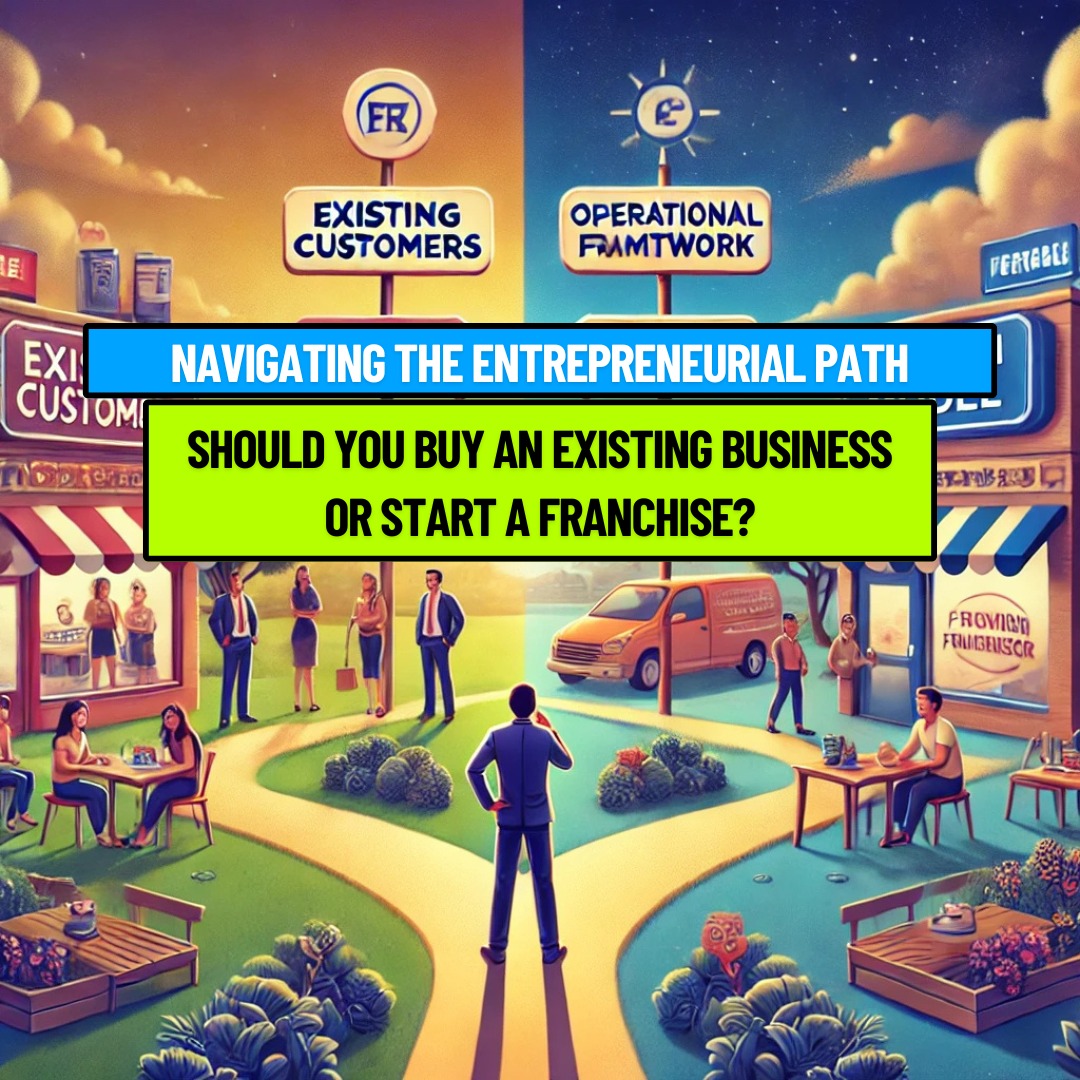INTRODUCTION
Entrepreneurial aspirations often ignite dreams of building something impactful and successful. For those considering taking the leap into business ownership, one critical decision often arises, should you buy an existing business or opt for a franchise? Each route presents unique opportunities and challenges, and the right choice hinges on your goals, risk tolerance, and resources. This guide explores the advantages, drawbacks, and key considerations of each option, offering valuable insights to help you navigate your path to business success.
The Allure of Buying an Existing Business
Purchasing an existing business offers the immediate satisfaction of stepping into an operational venture. This option can fast-track your entrepreneurial journey by providing an established framework and customer base.
Advantages of Buying an Existing Business
- Established Customer Base
One of the biggest advantages of acquiring an existing business is inheriting its loyal customers. A well-established customer base eliminates the initial hurdles of customer acquisition, ensuring revenue generation from day one. - Proven Track Record
Existing businesses come with financial statements, operational histories, and performance metrics. This data helps you evaluate profitability, understand market demand, and identify areas for growth. - Defined Policies and Procedures
Many existing businesses have standard operating procedures in place for operations, sales, and management. These established systems reduce the learning curve and enable smoother business continuity. - Tangible Assets
Purchasing an existing business often includes acquiring assets like inventory, equipment, and office space, which saves you from the time and expense of starting from scratch.
Challenges of Buying an Existing Business
While buying an existing business has its perks, it’s not without challenges:
- Hidden Liabilities
Financial statements may not always reveal the complete picture. Unexpected expenses, such as equipment repairs or unresolved lawsuits, can emerge after the purchase. - Declining Revenue or Outdated Practices
Some businesses struggle due to poor management or changing market dynamics. Turning around such businesses requires significant effort, time, and investment. - Cultural Integration Issues
Employees accustomed to the previous owner’s leadership may resist new management, requiring careful integration and change management.
The Franchise Advantage: A System for Success
Franchising offers an organized approach to business ownership. With a proven business model and ongoing support, franchises provide a lower-risk entry into entrepreneurship.
Advantages of Franchising
- Brand Identity and Reputation
Franchises come with the credibility of an established brand. This strong reputation facilitates customer acquisition and ensures faster business traction. - Proven Business Model
Franchises reduce the uncertainty of starting a business by offering a tried-and-tested model. Franchisees benefit from the franchisor’s experience and industry best practices. - Comprehensive Training and Support
Franchisors provide training programs, user manuals, and continuous support, helping franchisees navigate operational challenges with ease. - Economies of Scale
Franchises often benefit from bulk purchasing power, enabling franchisees to access supplies and equipment at reduced costs.
Drawbacks of Franchising
While franchises offer stability, they come with certain constraints:
- Limited Control
Franchisees must operate within the guidelines and restrictions set by the franchisor, limiting their autonomy in decision-making. - Ongoing Costs
Franchisees are required to pay royalties, marketing fees, and other ongoing charges, which can impact overall profitability. - Geographic Restrictions
Franchisors often impose restrictions on where franchisees can operate, potentially limiting opportunities for expansion.
Know more about advantages and disadvantages of Franchise-
Making the Right Choice
Choosing between an existing business and a franchise requires careful evaluation of your priorities and circumstances. Here are some key factors to consider:
- Risk Tolerance
If you’re comfortable with navigating the uncertainties of an existing business, this option might suit you. Franchises, on the other hand, offer a structured approach with reduced risk. - Experience and Knowledge
If you lack experience in the industry, the training and support provided by franchises can be invaluable. For seasoned professionals, an existing business might offer greater opportunities for innovation and growth. - Autonomy vs. Structure
Entrepreneurs who value creative freedom may prefer the flexibility of running an independent business. Conversely, those who thrive in structured environments might find franchising more appealing. - Financial Resources
Existing businesses often require a significant upfront investment, while franchises involve ongoing expenses. Assess your financial capacity to determine the most feasible option. - Growth Aspirations
If rapid expansion is your goal, an existing business provides more flexibility for scaling. Franchises, on the other hand, may limit expansion due to territorial restrictions.
Franchising in India: A Rising Opportunity
In India, the franchising industry is witnessing unprecedented growth. Driven by changing consumer preferences, favorable demographics, and government support, franchising presents an exciting opportunity for aspiring entrepreneurs.
The Indian franchise sector is valued at INR 800 billion and is projected to grow by 30–35% annually, reaching $140–150 billion in five years. Over 4,600 franchisors operate nearly 2 million outlets, spanning industries such as food and beverage, retail, and education. More than 53% of franchises are multi-unit operations, showcasing the model’s scalability.
To know more about Franchise business, do watch this video-
Why Franchising Stands Out in India
- Low Risk
Franchises mitigate risk with proven models and strong brand recognition. - Market Penetration
Franchises enable entrepreneurs to bypass the challenges of establishing a new brand and gain early traction in the market. - Cost Efficiency
Franchisors handle national advertising and provide local marketing support, reducing expenses for franchisees. - Operational Simplicity
Standardized procedures and robust support systems streamline operations, making it easier for entrepreneurs to succeed.
Conclusion
The decision to buy an existing business or start a franchise is deeply personal, influenced by your aspirations, financial resources, and risk appetite. Existing businesses offer flexibility and the potential for innovation but come with hidden challenges. Franchises, on the other hand, provide stability, a proven framework, and ongoing support but require adherence to a structured system.
For entrepreneurs in India, the burgeoning franchise industry presents a particularly compelling opportunity. With rapid growth, government backing, and a vast consumer base, franchising offers a pathway to success for those seeking a lower-risk entry into business ownership. Whether you choose to revive an existing business or leverage the power of an established franchise, your journey as an entrepreneur promises to be both rewarding and transformative.






